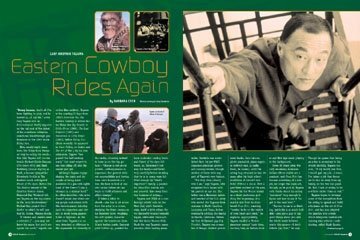Eastern Cowboy Rides Again
December 1, 2006 admin 0 Comments
—
 “Being human, that’s all I’ve been fighting to play, and be viewed as, all my life,” actor Cary Tagawa told an Entertainment Weekly reporter on the tail-end of the debut of his sometimes infamous, sometimes breakthrough performance in the 1993 movie Rising Sun.
“Being human, that’s all I’ve been fighting to play, and be viewed as, all my life,” actor Cary Tagawa told an Entertainment Weekly reporter on the tail-end of the debut of his sometimes infamous, sometimes breakthrough performance in the 1993 movie Rising Sun.Now, nearly eight years later, the Tokyo-born thespian may be eating his words–this July Tagawa will co-star beside Michael Clarke Duncan (The Green Mile) and Mark Wahlberg (Boogie Nights) as Krull, a human-sympathist Silverback Gorilla in Tim Burton’s much anticipated Planet of the Apes. Before the Tim Burton remake of the Charlton Heston classic, Memorial Day Weekend will see Tagawa on the big screen in the Jerry Bruckheimer/Michael Bay project Pearl Harbor in which he will portray Lt. Comm. Minoru Genda.
If viewers and readers need a refresher (“…you may not know his name, but you’d recognize his scowl,” reports one online film archive), Tagawa is the snarling El Japo from 1992’s American Me, the Eastern Cowboy in ethnic-factor flicks like Big Trouble in Little China (1986), The Last Emperor (1987) and Showdown in Little Tokyo (1991), before Rising Sun. (More recently, he appeared in Snow Falling on Cedars and The Art of War.) By his own admission, Tagawa “has passed the half-century mark,” but don’t expect to see him riding off into the sunset just yet.
Although Tagawa enjoys sharing the trials and triumphs of being Asian American in a pre-civil-rights Land of the Free–“I was a stranger in a strange land,” he often describes–the actor doesn’t exude any where-are-my-people malcontent with the show-business industry (and its supporters and critics) or decry being pigeonholed or typecast. At the same time, Tagawa’s in no way detached or oblivious to the arguments for diversity in the media, choosing instead to hone in on the big picture–“Change is not about protest…self-expression is important, but protest without responsibility and having done one’s homework is a loss. We have to look at our own racism before we can begin to build alliances and affect change.”
It takes a while to absorb–one has to sit across from the actor in a corner, studying the three creases on his furrowed brow, weighing the soft spoken character against the boisterous dress (black leather pants, Samurai-print button-up, pointed-toe bone snakeskin cowboy boots and Planet of the Apes billboard, er, fisherman’s hat atop his head)–and listen very carefully before deciding that he is in many ways fulfilled enough by “what’s important”: family, a passion for Chuu-Shin martial arts and peaceful time away from this business of acting.
Tagawa met YOLK at a non-descript artists’ cafe on the West (LA) side’s Sawtelle strip, itself a little ethnic flavor discreetly located beneath bigger, celebrated thoroughfare like Santa Monica Blvd. Much the way Tagawa’s career precedes other leading Asian males, Sawtelle was established first, by pre-WWII Japanese American grocers and nursery-owners, though neither of these were any part of Tagawa’s own history.
“I’m very clear [about] who I am,” says Tagawa, who emigrated from Japan with his parents at age six. His father was a Hawaiian native and member of the U.S. army who moved the Tagawas from overseas to North Carolina, Louisiana and Texas, before eventually settling the family in Duarte, California. Before his first Hollywood gig (Big Trouble), Tagawa was a number of things: student government leader, farm laborer, photo journalist, pizza-supplier delivery man (a mafia front, he muses), until the acting bug returned to him 19 years after his high school renditions of Camelot and Rebel Without a Cause. Now a part-time resident of the area, Tagawa hit the Venice strand as a street performer, peddling the beginnings of a martial arts form he christened Chuu Shin, meaning “‘center,’ to be in the middle of your heart and mind,” he explains. Appropriately, Tagawa exuded a “Native American energy” back then, via long hair, an Indian choker and New Age music playing in the background.
Some 15 years later, the only remaining American Indian effects visible are a pendant, and Chuu Shin has become something of a side job, no longer the main act, though, as he puts it, Tagawa only thinks about his acting “successes” long enough to figure out how to use it “to get to the next level.”
“Success to me is so fleeting, publicity is so much bullshit–you pay a guy to say good things about you and the whole world believes you’re this person–I don’t believe (in) that,” he says. Though he agrees that being an actor is secondary to his overall identity, Tagawa reasons, “If my family was first, I would quit my job…I mean, I’ve taken a job that forces me to also be away from my family, so the two run parallel. But I look at acting to be a vehicle rather than an end.”
Tagawa hopes to leverage some of the recognition from his acting to spread and build a business on the art of Chuu Shin, and has also adapted the practice into a form which integrates martial-arts training into athletic conditioning, called Ninjah Sports.
“I’m really an underdog in this (area), coming into sports where people may say, ‘Here’s an actor who thinks he knows what he’s talking about,'” says Tagawa, who draws from 10 years of studying various martial arts. “But I’m going to prove it, prove it works…I feel that at 50-going-on-51, I’m in better shape now than I ever was.” The plan is to teach both in Hawaii, where Tagawa’s wife and two children live.
When his acting days are done, Tagawa will live in Kauai full-time, potentially developing books for the Web on his experience making Krull and Lt. Comm. Genda. He may also teach acting, and of course, Chuu Shin and Ninjah Sports. A nice retirement of sorts, it’s not happening right away (Tagawa plans to act until his children, ages 10 and 13, become full fledged teenagers), and if anything, the master plan is only the realization of Tagawa’s own center.
“In many ways, I am a student teacher,” he says. “I’m not yet a teacher, because I’m always learning.” On acting, he says it’s the one profession where you are paid to simply imitate life, through observation and acceptance of multiple perspectives. “Hollywood is the business of illusion based on hype,” says Tagawa. “It’s not real, and ultimately, what’s not real, will fade.”
